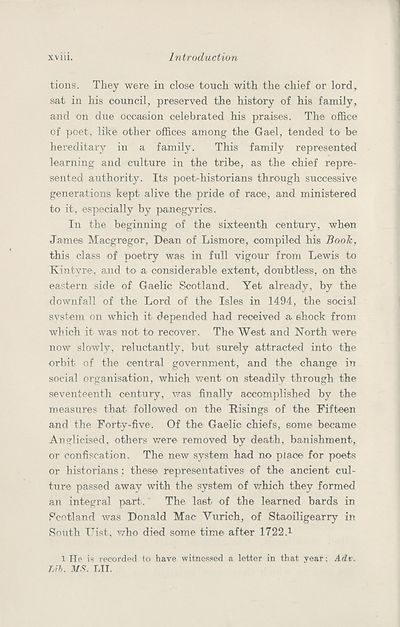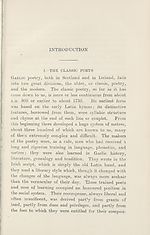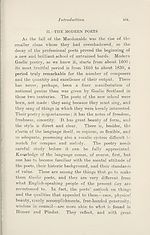Download files
Complete book:
Individual page:
Thumbnail gallery: Grid view | List view

Introduction
xviii.
tions. They were in close touch with the chief or lord,
sat in his council, preserved the history of his family,
and on due occasion celebrated his praises. The office
of poet, like other offices among the Gael, tended to be
hereditary in a family. This family represented
learning and culture in the tribe, as the chief repre¬
sented authority. Its poet-historians through successive
generations kept alive the pride of race, and ministered
to it, especially by panegyrics.
In the beginning of the sixteenth century, when
James Macgregor, Dean of Lismore, compiled his Book,
this class of poetry was in full vigour from Lewis to
Kintyre, and to a considerable extent, doubtless, on the
eastern side of Gaelic Scotland. Yet already, by the
downfall of the Lord of the Isles in 1494, the social
system on which it depended had received a shock from
which it was not to recover. The West and North were
now slowly, reluctantly, but surely attracted into the
orbit of the central government, and the change in
social organisation, which went on steadily through the
seventeenth century, was finally accomplished by the
measures that followed on the Risings of the Fifteen
and the Forty-five. Of the Gaelic chiefs, some became
Anglicised, others were removed by death, banishment,
or confiscation. The new system had no place for poets
or historians ; these representatives of the ancient cul¬
ture passed away with the system of which they formed
an integral part. The last of the learned bards in
Fcotland was Donald Mac Vurich, of Staoiligearry in
South TTist, who died some time after 1722.1
1 He is recorded to have witnessed a letter in that year; Adt.
Lih. MS. LII.
xviii.
tions. They were in close touch with the chief or lord,
sat in his council, preserved the history of his family,
and on due occasion celebrated his praises. The office
of poet, like other offices among the Gael, tended to be
hereditary in a family. This family represented
learning and culture in the tribe, as the chief repre¬
sented authority. Its poet-historians through successive
generations kept alive the pride of race, and ministered
to it, especially by panegyrics.
In the beginning of the sixteenth century, when
James Macgregor, Dean of Lismore, compiled his Book,
this class of poetry was in full vigour from Lewis to
Kintyre, and to a considerable extent, doubtless, on the
eastern side of Gaelic Scotland. Yet already, by the
downfall of the Lord of the Isles in 1494, the social
system on which it depended had received a shock from
which it was not to recover. The West and North were
now slowly, reluctantly, but surely attracted into the
orbit of the central government, and the change in
social organisation, which went on steadily through the
seventeenth century, was finally accomplished by the
measures that followed on the Risings of the Fifteen
and the Forty-five. Of the Gaelic chiefs, some became
Anglicised, others were removed by death, banishment,
or confiscation. The new system had no place for poets
or historians ; these representatives of the ancient cul¬
ture passed away with the system of which they formed
an integral part. The last of the learned bards in
Fcotland was Donald Mac Vurich, of Staoiligearry in
South TTist, who died some time after 1722.1
1 He is recorded to have witnessed a letter in that year; Adt.
Lih. MS. LII.
Set display mode to:
![]() Universal Viewer |
Universal Viewer | ![]() Mirador |
Large image | Transcription
Mirador |
Large image | Transcription
| An Comunn Gàidhealach > An Comunn Gàidhealach Publications > Bàrdachd Ghàidhlig > (22) |
|---|
| Permanent URL | https://digital.nls.uk/126455282 |
|---|
| Description | This contains items published by An Comunn, which are not specifically Mòd-related. It includes journals, annual reports and corporate documents, policy statements, educational resources and published plays and literature. It is arranged alphabetically by title. |
|---|
| Description | A collection of over 400 items published by An Comunn Gàidhealach, the organisation which promotes Gaelic language and culture and organises the Royal National Mòd. Dating from 1891 up to the present day, the collection includes journals and newspapers, annual reports, educational materials, national Mòd programmes, published Mòd literature and music. |
|---|---|
| Additional NLS resources: |
|

